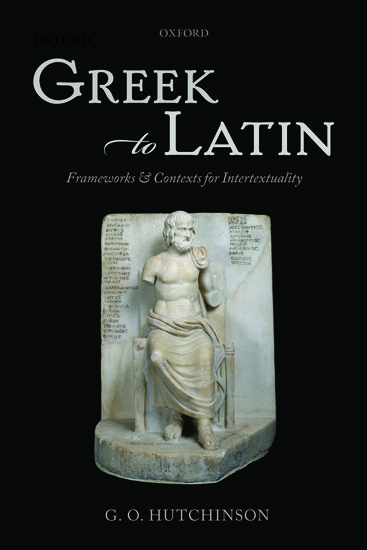By G. O. Hutchinson
How could you have one novel, poem, children’s book, that wasn’t influenced by others? But people haven’t much considered what distinguishes literary interaction that jumps across languages and countries. An interesting case is the impact of Greek literature on Latin literature. (We’ll concentrate on that way round, and on the time after the earliest Latin writers—we want systems, not origins.)
Here’s an Italian writer adapting a French half-sentence on literary lovers: “La gente volgare non immagina quali profondi e nuovi godimenti l’aureola della gloria, anche pallida o falsa, porti all’amore” (“common people do not imagine what deep new pleasures the halo of glory, even pale or false, brings to love”; D’Annunzio, 1889); “On n’imagine pas, d’ordinaire, ce que le nimbe de gloire le plus pâle même, ajoute à l’amour” (“people do not usually imagine what even the palest halo of glory adds to love”; Péladan, 1887). Key words recognizably match: immagina/imagine, gloria/gloire, pallida/pâle, amore/amour; but Greek and Latin vocabularies look fundamentally separate: a chasm, little bridged by borrowings. D’Annunzio is plundering a book just out; but Latin writers mostly feign to draw on a literature that had long faded away.
Let’s develop these two points in turn. Taking something from a writer in your own language creates an intimate relationship; often you use the very same words. Romans think the languages quite unlike: Latin weighty and hard, Greek light, quick, elegant. This suggests a moral contrast; aesthetically Latin is felt inferior. Greek’s sounds are “sweet”, “delightful”, Latin’s “gloomy”, “horrid”, especially the dreadful f, which requires a voice scarcely human. Latin writers contrast Greek and Latin passages, and find the Greek simpler, truer; most Romans thought Greek had a richer vocabulary (Cicero protested). A challenge, then: the Romans wanted victory, or at least an equal battle. That’s the recurring image: warfare. “Cicero,” says one writer, “stopped us being vanquished artistically by those we had vanquished in war.”

We often think of Roman writers just reading Greek texts. But Romans encounter Greek art with words in a rich panorama of cultural experience. In Rome, the wealthy young would learn Greek language, poetry, rhetoric, philosophy from Greek teachers; rhetoricians and philosophers performed. Greek teachers in Rome radically changed Latin prose after Cicero. Students were noisy, often desperately keen; young Seneca pursued a Greek philosopher during his teaching breaks to beg for more philosophy. Eventually Rome instituted public libraries and performance-based literary competitions; in both, as in education, Greek was at least equal to Latin. In their villas outside Rome, Romans could read Greek works with tame (well, tameish) Greeks to explain and discuss; they made their libraries atmospheric, with inspiring busts of authors, mostly Greek.
Part-Greek cities in South Italy, like Naples, had competitions and plays in Greek. Romans found Athens filled with memories of past writers. From the late second century BC, inscriptions confirm, Roman youths would often spend a year there, hearing eloquent philosophical lectures. For oratory there was Asia (Turkey), and Rhodes, where disputes on rhetoric could turn nasty. All over the Greek world there were games, theatres, law-cases. Marseilles offered Greek culture in a safe environment, Alexandria (if you had permission) in a racy one.
As you might gather, space is crucial to the interaction of these literatures. Greek literature centres on Greece and Asia Minor. Cicero and others turn Athenian oratory into an oratory graphically located in Rome. Roman philosophy presents Greek ideas through Roman speakers in Italian villas. Roman historiography has its spatial centre in Rome; if Greek Polybius describes Hannibal invading Italy, Livy’s version for Romans has a scarier orientation. Latin mythological poetry can be set in Greece or Asia, but with a sense of distance, or move gradually to Italy, like Virgil’s Aeneid or Ovid’s Metamorphoses. Unlike later Italians exploiting Latin, Romans root their use of Greek in ethnic and spatial separation. Leading elephants over the Alps is no bad image for the perpetual challenge they confronted—but they relished it.
So a lot is involved in this example of impact outside one language and literature: language, identity, space, chronological construction, concrete experience. It should set us exploring beyond academic segmentations, in our own demanding adventures.
G. O. Hutchinson is Professor of Greek and Latin Languages and Literature at the University of Oxford. He is the author of Greek to Latin, which is a comprehensive attempt to consider the relationship between these
two ancient literatures.
Subscribe to the OUPblog via email or RSS.
Subscribe to only classics and archaeology articles on the OUPblog via email or RSS.
Image credit: Woodcut showing Cicero writing his letters [public domain]. Via Wikimedia Commons.


I would be curious to know if persons writing in Greek east of Greece in the first century c.e. used Latin geographical terms in a popular way, e.g. “mare” for sea, as in “Mare Nostrum”. An answer is greatly appreciated.
Greek is weird it show lots of privates it gross geez